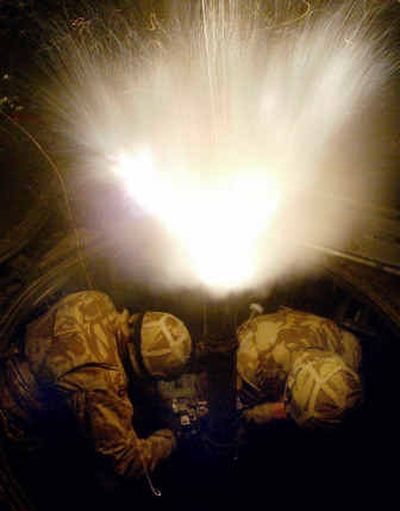Sunnis warm to process

BAGHDAD, Iraq – After months of strident rejection of the elections in Iraq, two top groups from the minority Sunni Muslim population said Friday that they’d join in drafting the nation’s constitution.
If the groups participate – there have been many past reversals – it would be a significant step toward bringing Sunnis into the political process and stemming sectarian divides that could cause civil unrest.
The insurgency, however, continued to show that it didn’t wish to join the fold. Gunmen stormed a Shiite Muslim mosque in north Baghdad, tackled and bound the guards and placed three homemade bombs inside.
The two that detonated didn’t kill anyone but did tear apart a prayer room and leave a clear message: “They want to start a civil war,” said the mosque imam, or spiritual leader, Bassim al Waeli.
The American military announced that a soldier was killed and seven soldiers were wounded by a roadside bomb in northern Iraq. A second roadside bomb in Beiji on Friday killed two other U.S. soldiers and wounded five, the military said today.
The new willingness Friday of the two Sunni groups, the Muslim Scholars Association and the Iraqi Islamic Party, to take part in the U.S.-backed political process came as partial polling results continued to show a big victory by a ticket of candidates guided by a Shiite cleric.
The United Iraqi Alliance, which formed with the counsel of top Shiite cleric Grand Ayatollah Ali al-Sistani, had more than 2.2 million votes in Iraq as of Friday afternoon.
The closest competition was a ticket headed by interim Prime Minister Ayad Allawi, a secular Shiite, with 579,708 votes.
So far, Iraq’s electoral commission had released results for 35 percent of the nation’s polling centers.
Each ticket’s number of seats in the new National Assembly will be determined by the percentage of votes it gets.
The Shiite United Iraqi Alliance figures to sweep much of the country, except for the Kurdish region to the north and some Sunni areas, where turnout wasn’t high to begin with.
Many Sunnis see the alliance and its backers as agents of Iran with the ultimate goal of installing a theocracy, which the Shiite officials deny.
Shiite leaders have reached out to the Sunnis in an attempt, many believe, to reduce the chances of civil war. Major Shiite political leaders have asked the Sunnis to participate in writing the constitution.
The largest Sunni political party, the Iraqi Islamic Party, said it was responding to that outreach. Aila al Maki, a member of the party’s political office, said the elections and crafting the constitution were two different processes.
“We will participate actively in the writing of the constitution,” Maki said. “It is our right because we are all Iraqis.”
Ahmed al Samaraee, a senior leader for the Sunni Muslim Scholars Association, said his organization would meet with the United Iraqi Alliance for talks about the constitution.
“We’re with any list chosen and supported by the Iraqi people, but we want this list to ensure the unity of this country, to see this country as one family and not to listen to the occupiers,” he said.